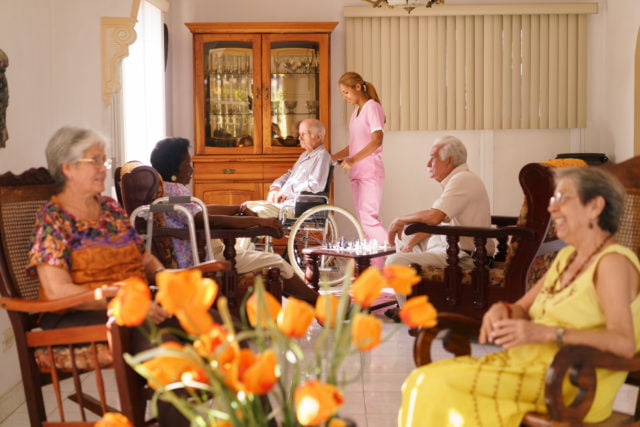
In-Home Senior Care – a Lot to Learn
The first baby boomers will turn 80 in 2026. Arranging in-home care by nurses, home health aides, physical and occupational therapists, or social workers will become a pressing concern for growing numbers of Americans. To sketch out the home care landscape, Squared Away interviewed Carol Levine, director of the families and health care project at the United Hospital Fund, a New York non-profit. She’s written widely on long term care, from academic articles to her new book, “Planning for Long-Term Care for Dummies.”
 Is it logical that baby boomers will try to avoid nursing or assisted living facilities and will view home care as the way to go – at least for as long as possible?
Is it logical that baby boomers will try to avoid nursing or assisted living facilities and will view home care as the way to go – at least for as long as possible?
You’re right. Most people, regardless of age, want to stay in their own homes. They think, “I don’t want to be in a nursing home. Therefore I’ll have home care” – as if they’ll both provide the same level of support or assistance. Home care may be even more complicated than nursing home care or assisted living, because it takes place in your own home, and because there are so many varieties.
Describe the two main types of care: skilled and personal.
The kind of care you need depends on your health condition and your abilities to manage your household – to get around, cook, shop. A medical condition that requires a nurse visit is one level of care. A lot of home care that is paid for by insurance comes after a health problem that lands you in the hospital. If you’re on Medicare, your doctor will have to document your need for skilled care, which means at least a nurse visit a few times a week. You may get a home health aide as well. If you just need someone to help out and monitor what’s going on, make lunch, do the laundry or do tasks like bathing, it’s called personal care.
How difficult is it to find trustworthy home care aides?
I took care of my late husband for 17 years, and he had wonderful aides that I paid for. And they were all men, except for one woman, and male aides are harder to find. I know it’s possible but I also know it’s not easy. Even with home health aides, family members are in charge of caregiving and do lots of it themselves. The main thing is to be very careful in your selection. Make sure the person comes to your home for an interview. If you’re with an agency, make sure the agency does background checks. If nobody looks, nobody’s going to find a criminal history. Although there are bad stories, there are a lot of wonderful people doing this work.
What are some typical home care arrangements and the lengths of time involved?
A person can need both nursing and personal care or need only one, depending on what’s going on. Someone who has, say, the beginning signs of dementia may need someone to be there more frequently than someone who had an infection related to diabetes and is recovering and becoming more independent.
If you fall and break your hip, you stay in the hospital for four or five days and go to a rehab facility for another couple of weeks. Your hip is fixed when you come home, but you need someone to help you bathe and get in and out of bed because you’re weak. Meanwhile, you’ll need a nurse to come and check your blood pressure and make sure the surgical site is clean and healing well. That might get you a nurse visit two or three times a week under Medicare and most insurance, and that would last for maybe three weeks. This is not long term – it’s weeks, not months.
If you’re employing a home care agency, the agency will determine how long they think you’ll need help. You can appeal but it’s not going to be every day and it’s not 24 hours a day. Many people get their ideas about home care from 1930s movies when the nurse comes in wearing a white uniform and cap, and the doctor drops by every day. That does not happen. It’s very sporadic, and it’s meant to be enough to get you on your feet and figure out what you need for the long term.
People with low incomes and long term disabilities can get Medicaid home assistance. Medicaid will send someone into the home to do the personal care – the daily living activities – and be there every day or several hours a day. That can be less expensive for the state than putting someone in a nursing home. It’s more for people who aren’t going to get better in the short or long term.
Another common option is paying for home care yourself. A lot of people find that when the insurance runs out, that’s what they have to do.
What are the most common ways people pay for home care?
The average hourly rate for home health aides is $18-$20. Older people on Medicare can use what the program may offer, or they may be eligible for Medicaid, which also has possibilities for longer-term home care. Or they pay on their own, using mom’s or their own limited or not-so-limited resources. It’s a great financial burden for a lot of people. For anyone in the middle – and the middle goes high these days – it’s expensive.
Is it better to hire a home aide on your own or through an agency?
Any insurance coverage – whether Medicaid, Medicare or private insurance – will require you to use a licensed home health care agency. They’re not going to pay for someone you hire on your own. They want to be reassured the person is qualified before they pay. There are different levels of agencies that can provide services, from very specialized to general.
If you’re on your own, you can use an agency but don’t have to. You can hire anybody, whether it’s through word of mouth or through an ad in the newspaper. There’s no back-up, and you’re the employer. You have to set up working arrangements, pay, days off and taxes.
A lot of people start out with an agency and, because agency rates may be higher, switch to private pay. They may find someone they really like who can be there all the time. One problem with agency hiring is that you may not get the same person every visit. Someone who is older may not like the idea of having different people come in and out of the house. When you hire on your own, you are more likely to see the same familiar face.
Situations also change. When you come out of the hospital, the needs may be more intense and greater than they will be two months down the road – or things may get worse, and you may need more help. The most important advice is that people understand that it’s a dynamic process, and what you’re set up with originally isn’t necessarily where you’ll be two or six months from now. It requires a lot of careful attention, whether it’s someone you hire on your own or someone you hire through an agency. You’re the person in charge.
There’s a lot to think about.
Nobody thinks about home care until you need it in a crisis. That’s unfortunate, because then there’s usually no time to do a lot of research. I hear it all the time: people just assume there will be a nurse waiting when you get home from the hospital. It may take a few days before the nurse shows up, and then people think they’re going to stay there. No. Nurses have precise schedules, and they have to be productive and efficient. The idea is to familiarize yourself with the options so that, should the occasion arise, you’ll have some idea of the broad landscape and have some idea of how you and your family member fit in.
The main thing your readers need to know is that a lot of the timing and the kinds of services you get will depend on your insurance coverage.
Is there a wide variety of home care?
Yes. You may have a physical therapist come in. You may have a speech therapist or a social worker. A number of different professionals may come in and do specific parts of what’s required, so the important things to know are who’s coming and why and what are they supposed to be doing. It can be basic nursing care or it can be complex, and it’s based on an assessment of what the needs are.
It can also be overwhelming when all these people start showing up if you’re not sure of the larger plan. Home care can be very complicated, for instance with a feeding tube or a ventilator, or it can be very straightforward, such as whether your scar is healing or you’re walking. If you’re the family member, think of it this way: nobody’s going to be there 24 hours per day so you have to make arrangements for the other 22 hours per day.
What should you know when your elderly relative comes home from the hospital?
Think about what the person needs right now. Perhaps she had been used to being independent, doing all her own shopping, cooking, laundry, and paying her own bills, with occasional help. Now you’re going to have to figure out, at least until she might get back on her feet, how to do that.
There are also safety concerns. The hospital experience is disorienting, so people who come home are not themselves cognitively for the first few weeks. You don’t want to leave your dad alone when he gets home. He may want someone just to be there in case something goes wrong. This involves a lot of sitting around, talking, watching TV and just being a good family member.
On the other hand, your relative may not want that. But often people go back to the hospital if they fall, don’t take their medications, or if there are medication side effects. Someone must be alert to what’s happening and let the doctor know something doesn’t seem quite right. This can be anxiety producing, because it’s a lot of responsibility.
How can you prepare?
Everybody in the family and your close circle of friends should be on the same page when it comes to what’s happening and what the person needs so they’re sharing the responsibilities. This can also lead to more substantive discussions about the long term. This shouldn’t be the sole responsibility of the adult daughter or the one who lives closest. Also hospitalization is often a clue that something else is going on, and you’ll need to be thinking more long term. But the priority is: what are you doing today?
Is licensing an issue when people hire help on their own?
There are no statistics about how often people hire home care on their own, because it’s not paid for by insurance. My guess is – and everyone seems to think – it’s a large pool of workers, often immigrants, often women. They can be fabulous, and they can be not-so-good.
In hiring on your own, get good references and be really clear about the responsibilities and boundaries and what is permitted and what is not permitted. Visitors should not be permitted. Phone calls to other people – not permitted, except for emergencies. But understand also this is a person occupying the family’s space, so you have to negotiate. Food may be a big issue: the home aide may have different views about what constitutes a good lunch. Religion and language can be issues.
Home care workers, whether nurses, aides or physical therapists, are not interchangeable. They’re individuals who approach the job differently, and you have to work with them to determine what works in your situation. One source of many problems: an assumption the aide will do everything. That’s not necessarily how she understands her job.
Is there an age, say 80 or 85, at which there’s a jump in the share of people requiring home care?
Anyone over 85 is more likely but age isn’t the main criterion. The two things that really precipitate the need for home care are a fall or the onset of dementia. You can get to 80 home free, but then you fall and things start to happen, or there will start to be clues there will be a need for more supervision. The point here is to be alert to those things and not ignore them.
In terms of falls, try to remove risks such as scatter rugs and wires. A change in medications can make people dizzy or not as alert as they were, so know the meds and their side effects. Home care is not inevitable. There’s a lot you can do to keep people healthy enough to remain on their own, but when there is a decline at an older age, it usually doesn’t get less. It gets more.
Do people rely on over-stressed family only if they can’t pay, or do they pay only if the family burden becomes too great?
It depends on the family. A lot of people, even if they can pay, will over-depend on their family because they say, “I don’t want strangers in my house.” The Depression generation doesn’t believe in paying for care and will say, “My daughter or daughter-in-law will do it.” But the baby boom generation is going to be interesting, because they’ve been all about “I can do this.” I’m not sure they’ll be so eager to have home care, and in the end it’ll be a matter of which relative comes in and takes on this role. Illness and frailty, once you’re facing it, change a lot of the things you think you would do.
Can you suggest where to find more information about home care?
• New York City offers a guide to clues that more in-home health may be needed for a loved one.
• The Centers for Medicare & Medicaid Services has a comparison webpage for basic information about a home care agency’s inspection record and quality standards.
• Remember that commercial websites send you to agencies that have paid to be on that site.
• A really good source of information are friends and family who’ve had home care.
• Next Step in Care, part of the non-profit where I work, provides accurate, up-to-date and comprehensive information for family caregivers and health care providers about going from hospital to home or from rehab to home. The website includes a section on home care. It won’t tell you which agency to hire but it lists the questions to ask.
• The Medicare website is good for what Medicare covers.
• Medicaid is state-run so go to the state site.
• Licensing requirements for home care agencies are also set by the states.
Comments are closed.







No questions here, I’d only like to say that this interview was very thorough and the answers provided by Levine were very on point. I know this because I’ve actually worked closely with an elderly home care agency in LA, and the process with which our agency goes through doing background checks for caregivers is exactly as is described in this piece. Likewise, the process that people go through to find the best caregiver (when they are not looking last minute) is exactly as Levine described it.
Nothing more to say here other than great post!